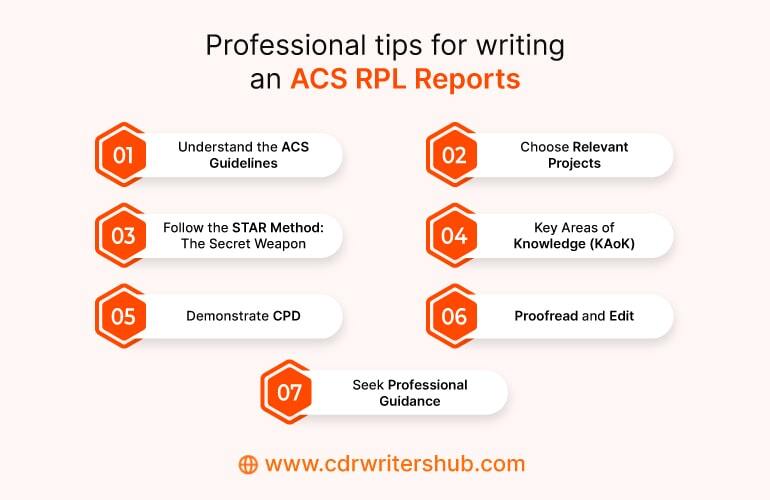7 Professional Tips for Writing ACS RPL Reports

7 Professional Tips for Writing ACS RPL Reports
As an Information and Communication Technology (ICT) professional aiming to start a career in Australia, the Recognition of Prior Learning (RPL) report is your essential tool. It allows you to showcase your skills and expertise to the Australian Computer Society (ACS) for skill assessment, even if you lack formal qualifications. This blog is your go-to resource, offering expert advice on creating strong ACS RPL reports.
Understanding ACS RPL Reports
Table of Contents
In the Information and Communications Technology (ICT) field, the Australian Computer Society (ACS) is a big deal. They’re like the professional guardians of all things related to ICT in Australia. Among their many roles, one crucial job they do is evaluating the skills and qualifications of ICT professionals who want to work.
Here, we will give you professional tips on creating an ACS RPL Report. This report is essential if you’re considering moving to Australia for work. But before you get in, make sure to read the ACS skills assessment guidelines. These guidelines will show you the way if you’re considering the Migration Skills Assessment Program.
But remember, when it comes to immigration or visas, the ACS isn’t your go-to source. You need to follow the Department of Home Affairs guidelines about visa-related things. If you’re planning to move to Australia and your ICT skills need to improve, ACS is here to help. They want to know about your qualifications and work experience, especially if you still need official ICT qualifications.
This ACS Skill Assessment part is for people who may have yet to get ICT degrees from Australian universities but have lots of experience in ICT. When it’s time for the RPL Assessment, you can ask for an ICT Skills Assessment. This helps connect your skills with job opportunities in Australia.
Sections of the RPL Application Form
Before we get into the complex process of writing your ACS RPL reports, let’s first understand the RPL application form. This section, often overlooked, plays a crucial role. Here, you provide vital information about your professional background, qualifications, and the specific ICT occupation you are targeting. The accuracy and completeness of this section are pivotal for a successful assessment.
Section 1: Key Knowledge Areas
The Key Knowledge Areas are derived from the knowledge and competencies you’ve achieved throughout your career. This section is where you detail how your experience and qualifications go along with the specified Areas of Knowledge.
It’s crucial to explain how and where you acquired this knowledge. In this section, you must select one item from the Essential Core ICT Knowledge and another from the topic of the General ICT Knowledge. You should follow the ACS Core Body of Knowledge (CBOK) standards for ICT Professionals to understand better what to include.
Section 2: Project Report Form
The Project Report Form is your opportunity to delve into the nitty-gritty of your ICT skills. Each report should center around an important project or work experience in information technology. These reports show that you understand and can apply the Knowledge Areas listed in Section 1 of the application.
Remember: When you complete the RPL Knowledge and Project Report form as a part of your ACS skills assessment application, you must follow this statement:
“The person applying promises that everything in their application is true and matches what they did in their projects. If they copy someone else’s work, their application will get canceled, which could affect future applications. The ACS might also tell the Australian Department of Home Affairs about it.”
Professional tips for writing an ACS RPL Reports
Now, let’s get into the main part of this blog: creating an ACS RPL report that stands out.
1. Understand the ACS Guidelines
The first step to success is understanding the ACS guidelines. These guidelines are your road map for crafting your report. They specify what to include, how to structure your report, and what’s expected of you. Here’s what you need to know regarding this starting point:
- Purpose and Structure: Your RPL report comprises two sections – Key Areas of Knowledge and Project Report Forms. Each has a specific role and requirements.
- Language Proficiency: Your report should be in English. If English isn’t your first language, you must be ready to show your language skills through tests.
- Plagiarism: The ACS has a strict policy against plagiarism. Everything in your report must be your work, and you should provide proper references where necessary.
- Project Descriptions: The ACS emphasizes detailed, clear, concise project descriptions.
2. Choose Relevant Projects
Selecting the right ICT roles is fundamental in your RPL report. These roles should match the ANZSCO code and the ICT occupation you aim to pursue. Remember, the ACS RPL Reports assesses only the roles mentioned in your report, so your choices matter.
3. Follow the STAR Method: The Secret Weapon
An effective technique in your ACS RPL reports is the STAR method. It’s a structured approach that can enhance your project descriptions. STAR stands for Situation, Task, Action, and Result:
- Situation: Provide context by explaining the situation or problem your project aimed to address.
- Task: Detail your responsibilities and tasks within the project.
- Action: Describe your actions to address the situation and accomplish the task.
- Result: Share the outcome, quantifying your achievements wherever possible.
4. Key Areas of Knowledge (KAoK)
The Key Areas of Knowledge (KAoK) section is where you show your theoretical understanding of your chosen ACS RPL’s ICT occupation. Here’s how to approach this section:
- Cover All Knowledge Areas: Make sure you address all the knowledge areas listed in the ACS guidelines. These areas are specific to your chosen ICT occupation. Provide examples and explanations to prove your understanding.
- Use Real-Life Examples: Refrain from talking about general stuff. Instead, use real-life examples from your work to explain what you know. Show how you applied your knowledge to solve problems and make decisions.
- Be Clear and Concise: Keep your descriptions in the Key Areas of Knowledge section clear and concise. Avoid unnecessary technical jargon and focus on explaining concepts.
- Reference Your Projects: Connect the knowledge areas with the projects you describe in the Project Report Forms section; it creates a logical connection between your theoretical knowledge and practical experience.
5. Demonstrate Continuous Professional Development (CPD)
Continuing Professional Development (CPD) is critical to your ACS RPL reports. The ACS likes candidates who keep learning and growing in ICT. Tell them about any training, courses, certificates, or other professional growth you’ve done. Highlight the relevance of these activities to your chosen ICT occupation.
6. Proofread and Edit
A polished RPL report is likelier to make a positive impression on the assessors. Follow these steps for a thorough review:
- Content Review: Be sure your project descriptions are correct, support your knowledge claims, and show your CPD activities.
- Grammar and Style: Proofread for grammar and style, maintaining a consistent tone throughout the report.
- Consistency: Confirm that your report maintains a consistent writing style and tone.
- Structure: Ensure your report follows the ACS guidelines and maintains a logical flow.
- Clarity: Ensure your descriptions are clear and straightforward because assessors might need to learn more about your field.
- Seek Feedback: Have a trusted colleague or friend review your report and provide feedback.
- Avoid Plagiarism: Plagiarism is a severe offense in your RPL report. All information and all claims must be your work, supported by authentic evidence. Always provide explicit references when you cite external sources or knowledge areas.
7. Seek Professional Guidance
Making ACS RPL reports can be tricky, especially if English isn’t your first language or you must be more experienced in technical writing. In such cases, professional help can be invaluable. Expert RPL writing services can support crafting a well-structured and compelling report.
When choosing a professional service, consider:
- Experience: Choose a service with a track record of helping clients with ACS RPL reports.
- Native English Writers: Check that they have people who speak English as their first language or are good at English.
- Customization: The service should customize the report based on your experience and chosen ICT field.
- Submission: Confirm that the service follows ACS guidelines and rules to ensure your report gets accepted.
- Feedback and Reviews: Review past clients’ feedback and reviews to gauge the service’s quality.
Why is the RPL Report necessary for Migration Skill Assessment?
If you’re an engineer in Australia without formal ICT qualifications, there’s a way for you to prove your skills. It’s called the Recognition of Prior Learning (RPL), and the Australian Computer Society (ACS) reviews it. Many ICT professionals learn and gain experience in the field even without traditional qualifications. The ACS RPL Skills assessment lets them show what they know.
In the first part of the ACS RPL Reports, called the “Key Area of Knowledge,” non-ICT pros can explain how they learned essential skills while working. The second part, the “Project Report Form,” allows candidates to discuss two critical projects they’ve worked on.
If you meet these criteria, the ACS RPL process is your pathway to assessing your skills. It’s a fair chance for professionals like you to have your qualifications recognized, even if you still need to get a formal ICT education. It’s all about giving everyone a shot to show their skills and experience in the industry.
Conclusion
Writing ACS RPL reports can be challenging, but you can prove your skills and qualifications to the ACS assessors with the right approach. By following the expert advice in this blog, you can make a strong RPL report that improves your chances of passing. With these steps, you’ll be ready to handle the ACS RPL assessment process and get closer to your dream of working in Australia as an ICT professional.



